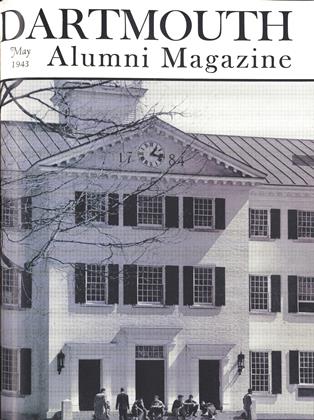ALTHOUGH PLANS for this issue of the , ALUMNI MAGAZINE aren't known at this writing, it seems a fairly safe bet that by the time you reach this page you will have seen a good deal about the Navy College Training Program at Dartmouth. Nevertheless, you may be interested in the part Thayer School will play in it, and the significance of the program in the Thayer School organization. Ever since the first approval of Dartmouth for a unit in engineering, announced early in February, we have realized that we would be teaching principally "for the Navy" starting this summer. However, no public announcement was possible until more formal verification of the Navy's intentions was received.
After reviewing the various V-12 engineering curricula, Dean Garran requested the Navy to assign men to Thayer School for training in the civil engineering curriculum only. This curriculum consists of eight sixteen-week terms extending over a period of two years and eight months. He indicated that it would be possible to handle classes of thirty men, anticipating according to this plan, an enrollment of sixty engaged in third- and fourth-year studies completely in the Thayer School and thirty students in second-year work both in Thayer School and in other departments of the College. The Navy has indicated that it expects to observe our requests in these respects. During the first two terms, starting July first, we expect to have an enrollment of approximately twenty fourth-year students, twenty-five third-year students, and thirty second-year students, all of whom are already enrolled at Dartmouth. The Navy may assign additional students from other colleges to complete our maximum enrollment.
Although it is expected that our major enrollment will consist of apprentice seamen, there will undoubtedly be a few civilian students in each class, and these men will, of course, be eligible to take the same engineering courses as the Navy enlistees. In order to contribute as fully as possible to the Navy's demand for civil engineers, we have found it necessary to suspend the operation of other curricula which have been taught here recently, including the Tuck-Thayer course in Business Administration and Engineering and the mechanical and electrical options offered this year.
Many of you have undoubtedly read Dean Cooley's article in the April issue of "Civil Engineering" indicting the specialized wartime training of engineers. The sentiments of Dean Cooley are an expression of the Thayer School policy, dating back to 1871, requiring its students to offer courses in college liberal arts subjects for admission to the School. Last fall, as you know, we regretfully reduced our entrance requirements to two years of preliminary study as long as the wartime shortage of manpower, and particularly of manpower with technical training, might last. We still believe this step was wise and necessary under the circumstances. In fact, it has enabled us to fit our students into the proposed Navy curriculum with a minimum of adjustment. I should like to reassure our alumni that the Navy curriculum for civil engineers, which will be offered to enlisted men and civilians alike at Thayer School, is not narrowly specialized. The breadth of training, which has characterized the Thayer School curriculum since its founding, remains. For example, in addition to the strictly technical engineering subjects, all of which are included, the Navy requires such courses as Engineering Law, Technical Report Writing, Economics of Engineering (two semesters), and Industrial Organization. Whatever compromises the School has made in its principles of engineering education were made last fall by the reduction of entrance requirements. The adoption of the Navy curriculum has necessitated no additional sacrifice of educational standards.
I hope that my decision to make this a frank, personal description of Thayer School as a Naval training unit for civil engineers rather than a report of alumni activities this month meets with your approval. Next month there will be some news of your friends.
 View Full Issue
View Full Issue
More From This Issue
-
 Lettter from the Editor
Lettter from the Editor'Round the Girdled Earth
May 1943 -
 Article
ArticleTHE LIBERAL ARTS COLLEGE
May 1943 By W. H. COWLEY '24 -
 Article
ArticleBrief Biographies of Buildings
May 1943 By LEON BURR RICHARDSON '00 -
 Article
ArticleFrom the Mailbag
May 1943 -
 Class Notes
Class Notes1937
May 1943 By JOHN H. DEVLIN JR., FREDERICK K. CASTLE -
 Class Notes
Class Notes1918
May 1943 By ERNEST H. EARLEY, RICHARD A. HOLTON
William P. Kimball '29
-
 Class Notes
Class NotesThayer School
May 1941 By William P. Kimball '29 -
 Article
ArticleThayer School
January 1949 By William P. Kimball '29 -
 Article
ArticleThayer School
April 1950 By William P. Kimball '29 -
 Article
ArticleThayer School
December 1954 By WILLIAM P. KIMBALL '29 -
 Article
ArticleThayer School
April 1955 By WILLIAM P. KIMBALL '29 -
 Article
ArticleThayer School
OCTOBER 1971 By WILLIAM P. KIMBALL '29







